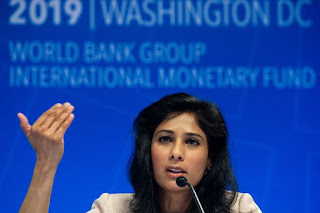
When countries around the world decline at the fastest rate in decades, the International Monetary Fund reports, the global economy will contract by 3 percent this year.
The pandemic said the world was thrown into a "crisis like no other." The Fund has added that a prolonged outbreak would challenge governments and central banks' ability to contain the crisis. Gita Gopinath, the chief economist at the IMF, said the recession could knock off global GDP by $9 trillion (£7.2 trillion) over the next two years.
Although the new World Economic Outlook from the Fund praised the "swift and significant" response in countries like the United Kingdom, Germany, Japan, and the US, it said no country will avoid the downturn. If the pandemic disappears in the second half of 2020, it expects global growth to recover to 5.8 per cent next year.
The IMF forecasts that the UK economy will shrink by 6.5 per cent in 2020 compared to the January estimate for GDP growth of 1.4 per cent. A decrease of this magnitude will be greater than the drop in production of 4.2 per cent seen in the aftermath of the financial crisis.
It would also mark the largest annual fall since 1921, according to restored Bank of England data from the 18th century. That, however, is half the OBR's projected annual rate, which expects GDP to fall by 35 percent in the three months up to June.
UK Chancellor Rishi Sunak has promised billions of pounds in pay subsidies and loan guarantees to assist employees and businesses during the shutdown. Also the Bank of England has cut interest rates to a new low and opened up billions of pounds for lending to commercial banks.
Ms Gopinath said it was expected that both developed and emerging economies would collapse into recession for the first time since the Great Depression.
The IMF cautioned that advanced-economy growth would not return to its pre-virus peak until at least 2022. This year, the US economy is forecast to contract by 5.9 per cent, marking the biggest annual downturn since 1946. This is also predicted that unemployment in the US will rise to 10.4 per cent this year. A partial recovery with estimated US growth of 4.7 percent is anticipated in 2021.
It is estimated that the Chinese economy would develop this year by just 1.2 per cent, which would be the slowest growth since 1976. Australia will be facing its first recession since 1991.
It said this would knock an extra 8 percentage points off global GDP if the pandemic took longer to contain and a second wave occurred in 2021.This scenario could cause a downward spiral in heavily indebted economies, the Fund said. It said creditors will not be able to lend to any of those nations, driving up borrowing costs.
Although longer lockdowns would limit economic activity, the IMF said quarantines and measures of social distancing were vital. It called for more funding for healthcare services, financial support for staff and companies, continued support from central bank and a consistent recovery exit strategy. It urged the world to collaborate in discovering and providing drugs and a vaccine.The Fund added that in the coming months and years a number of developed nations will need debt relief.

No comments:
Post a Comment